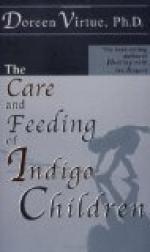Children, who are allowed to have their own way in matters of eating are very likely to be badly trained in other respects; while those who have been properly trained in matters of eating can usually be easily trained to do anything else that is important.
Learning to eat proper things in a proper way forms therefore a large part of a child’s early education. If careful training in these matters is begun at the outset and continued, the results will well repay the time and effort required.
Whether the child feeds himself or is fed by the nurse, the following rules should be observed:
1. Food at regular hours only; nothing between meals.
2. Plenty of time should be taken. On no account should the child bolt his food.
3. The child must be taught to chew his food. Yet no matter how much pains are taken in this respect, mastication is very imperfectly done by all children; hence up to the seventh year at least, all meats should be very finely cut, all vegetables mashed to a pulp, and all grains cooked very soft.
4. Children should not be continually urged to eat if they are disinclined to do so at their regular hours of feeding, or if the appetite is habitually poor, and under no circumstances should a child be forced to eat.
5. Indigestible food should never be given to tempt the appetite when the ordinary simple food is refused? food should not be allowed between meals because it is refused at meal-time.
6. One serious objection to allowing young children highly seasoned food, entrees, jellies, pastry, sweets, etc., even in such small amounts as not to upset the digestion, is that children thus indulged soon lose appetite for the simple food which previously was taken with relish.
7. If there is any important article of a simple diet such as milk, meat, cereals, or vegetables, which a child habitually refuses, this should always be given first at the meal and other food withheld until it is disposed of. Children so readily form habits of eating only certain things and refusing others that such an inclination should be checked early.
8. If an infant refuses its food altogether, or takes less than usual, the food should be examined to see if this is right. Then the mouth should be inspected to see if it is sore. If neither of these things is the cause, the food should be taken away and not offered again until the next feeding time comes.
9. In any acute illness the amount of food should be much reduced and the food made more dilute than usual. If there is fever, no solid food should be given. If the child is already upon a milk diet, this should be diluted, and in some cases partially peptonized.
10. In very hot weather the same rules hold, to give less food, particularly less solid food, and more water.




